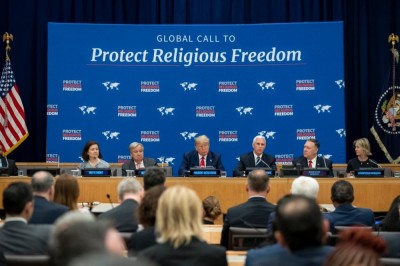Religious persecution is engulfing the world
Believers in many countries face severe challenges, according to the State Department’s annual Report on International Religious Freedom, released last week.

Religious freedom conditions in China, Nigeria, Pakistan, Iran, and many other countries fail to meet basic international human rights standards. This led Secretary of State Mike Pompeo to decry the “great darkness over parts of the world where people of faith are persecuted or denied the right to worship.” This dire report comes on the heels of a historic directive issued by the Trump administration to advance religious freedom’s standing in U.S. foreign policy.
The State Department’s latest report points to China as a global leader in religious freedom violations. In 2019, Christians, Uyghur Muslims, Tibetan Buddhists, and Falun Gong practitioners all found themselves victims of the Chinese government’s continued campaign against religion.
The report noted that the ruling Chinese Communist Party (CCP) forces state-affiliated religious institutions to insert government propaganda into their teachings. Meanwhile, the CCP shuts down unregistered houses of worship altogether. The U.S. government estimates that China arbitrarily detains over one million Uyghurs due to their faith and ethnic identity. The Chinese government will go to great lengths to suppress religious belief, leading Secretary Pompeo and other U.S. officials to label China’s oppression a “war on faith.”
The State Department’s report also recognized mounting inter-religious violence in Africa. The last year saw Muslim Fulani militants commit many violent attacks on Christians. The terrorist groups Boko Haram and the Islamic State West Africa Province (ISWAP) brutally attacked both Christians and Muslims in large numbers. A surge in violent attacks has occurred in recent months.
Pakistan continues to be a dangerous place for religious minorities. The report noted complaints against the Pakistani justice system, which regularly fails to bring perpetrators of violence against religious minorities to justice “due to a lack of follow-through by law enforcement, bribes offered by the accused, and pressure on victims to drop cases.” There continues to be reports that young Christian and Hindu girls were kidnapped, forced to convert to Islam, and forced to marry their captors. Societal discrimination against Christians and the enforcement of blasphemy laws continue to make life difficult for Pakistan’s impoverished Christian communities.
As religious believers encounter intimidation and danger in so many parts of the world, the United States is well-positioned to advocate for change. The U.S. has benefited immensely from the “first freedom” enshrined in our First Amendment and cherished by our Founders. But religious freedom is not only for Americans — it is a human right owed to all people, and it benefits everyone when religious freedom is respected. Countries that embrace religious freedom are more secure and make stable trading partners, which promotes regional economic growth. The United States’ role in advancing religious freedom as a fundamental human right contributes to a safer and more prosperous world.
To their credit, the Trump administration has paid attention to the plight of religious communities around the world. On June 2, President Trump signed a historic executive order dedicated to promoting religious freedom, pledging that “the United States will respect and vigorously promote this freedom.” The order requires the prioritization of religious freedom in the State Department and the United States Agency for International Development (USAID). U.S. officials have, at times, referred to religious freedom as a foreign policy priority, but their statements have often lacked teeth. Now, per the executive order, the State Department and USAID must develop a plan to implement it within 180 days. Under the Trump administration, religious freedom is getting the attention it deserves.
The State Department’s latest report indicates global religious freedom conditions are deteriorating, and this compels us to act quickly and efficiently. President Trump’s executive order was an important first step, but there is still much more to be done. As the State Department and USAID look to implement this order, they should fully embrace all possible options for promoting religious freedom abroad and protecting religious communities. In many countries, repressive governments have effectively silenced religious minorities from speaking up to defend themselves, but the United States has the opportunity to speak up on their behalf. If implemented correctly, President Trump’s executive order will enable U.S. diplomats to do just that.
Arielle Del Turco is Assistant Director of the Center for Religious Liberty at Family Research Council.





















